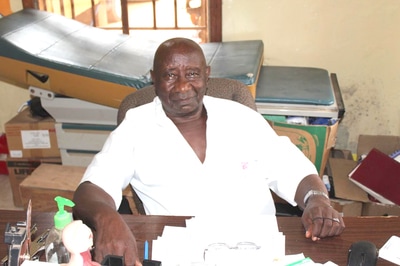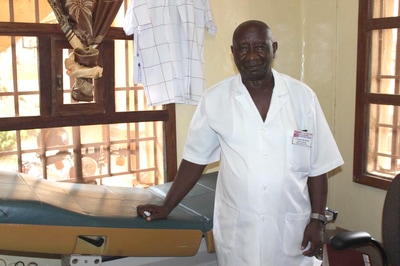|
Mercy's Chief Medical Officer, Dr. Bockarie Kanneh has been on staff at Mercy Hospital since October 2013. Prior to coming to Mercy, Dr. Kanneh was educated and practiced medicine in Russia, and served as the Chief Medical Officer of Bo Government Hospital. After retiring from the Ministry of Health, he joined Mercy 10/15/13. Dr. Kanneh is married, and has four children and "many" grandchildren. He is Muslim, but all four of his children are Christian - a fact he's quite pleased and proud of.
Q: Why did you want to become a doctor? A: When I was in high school, my mother had a terrible headache. She claimed, as many did in that time, it was very common, that her skull had split open. This idea started the interest for me and I began my studies in the medical field. After medical school, I realized that what she thought was a cracked skull was actually completely fine. It was just a myth that people believed. Q: Where did you go to medical school? A: I went to medical school in Kharkov (now a town in Ukraine) in the Soviet Union (now Russia). It was a government scholarship from the Soviet Union. You had to apply and do an interview. There were probably around 10-15 of us in my class and people came from different countries. We were there for seven years. The first two years were very difficult. We had to learn Russian and all our textbooks and lectures were in Russian. Q: What do you love most about being a doctor? A: To be specific, when I came out I studied general medicine. I was at a main referral hospital in Freetown and got experience in obstetrics and gynecology. It really inspired me and I started working at Marie Stopes for many years. I could be in the operating theatre for hours. I really enjoyed working there. I like maternal and child health. When you hand a woman her baby and they say "thank you." That "thank you," money cannot buy. Q: What do you find most challenging? A: When in surgery you go in and do your very best and the patient still dies. You feel guilty, but can’t even identify the reason and it is quite distressing. Also, I remember one case. The woman was a hemophiliac and had already had two cesarean sections. Her last doctor told her she should not have another child because of the blood clots. But I didn’t know any of this. So every time I would try to put the needle in she would just bleed. It was horrible (he tears up a little, remembering). Q: What advice would you give a young person in Sierra Leone who wants to pursue a career in medicine? A: Do general medicine and specialize in whatever area is an interest to you. It is the interest you have in treating patients that makes all the difference. Also, a very good doctor is one who is always available, always on call. You can be a great doctor and have a wonderful facility, but if you are not available it does not matter.
0 Comments
Your comment will be posted after it is approved.
Leave a Reply. |
Follow us on social media
Archive
July 2024
Click the button to read heartfelt tributes to a beloved Bishop, co- founder of our mission!
Post
|
Helping Children Worldwide is a 501 (c) 3 nonprofit organization | 703-793-9521 | [email protected]
©2017 - 2021 Helping Children Worldwide
All donations in the United States are tax-deductible in full or part. | Donor and Privacy Policy
©2017 - 2021 Helping Children Worldwide
All donations in the United States are tax-deductible in full or part. | Donor and Privacy Policy








